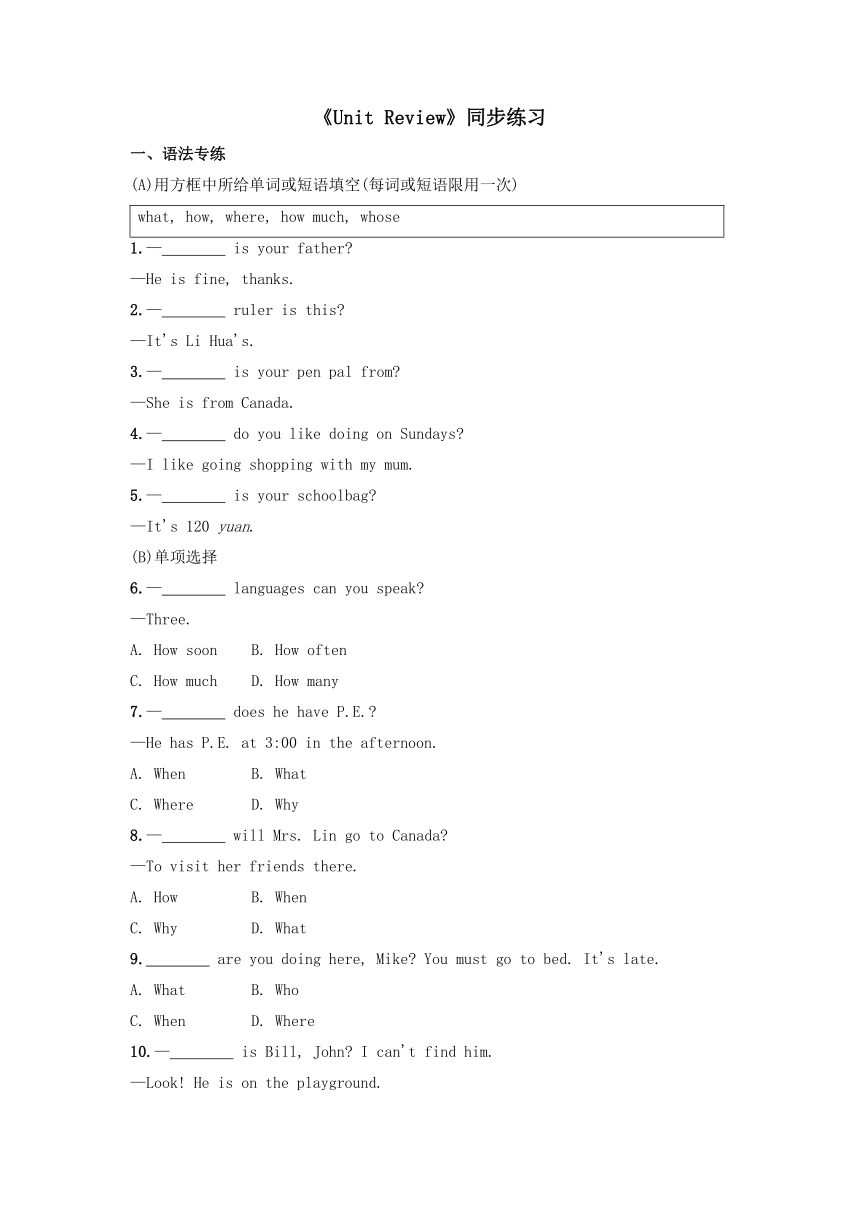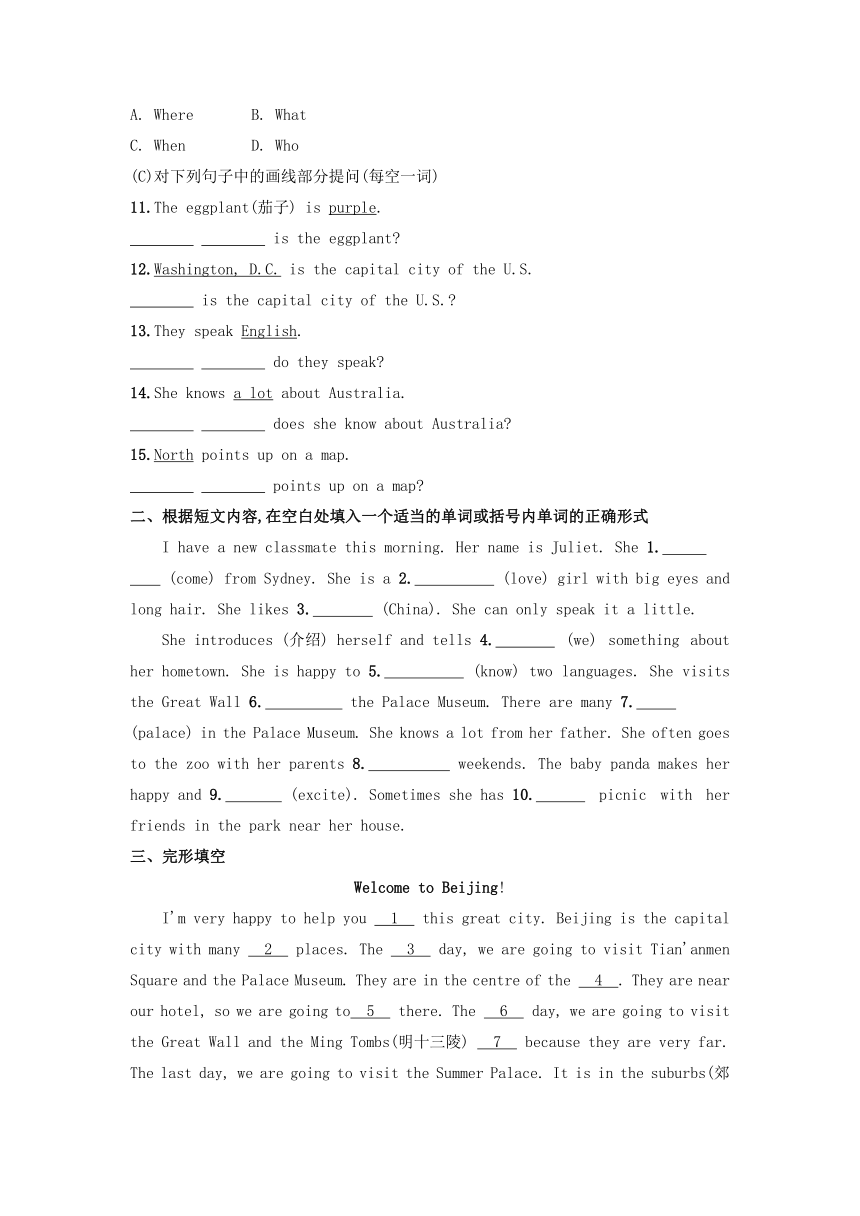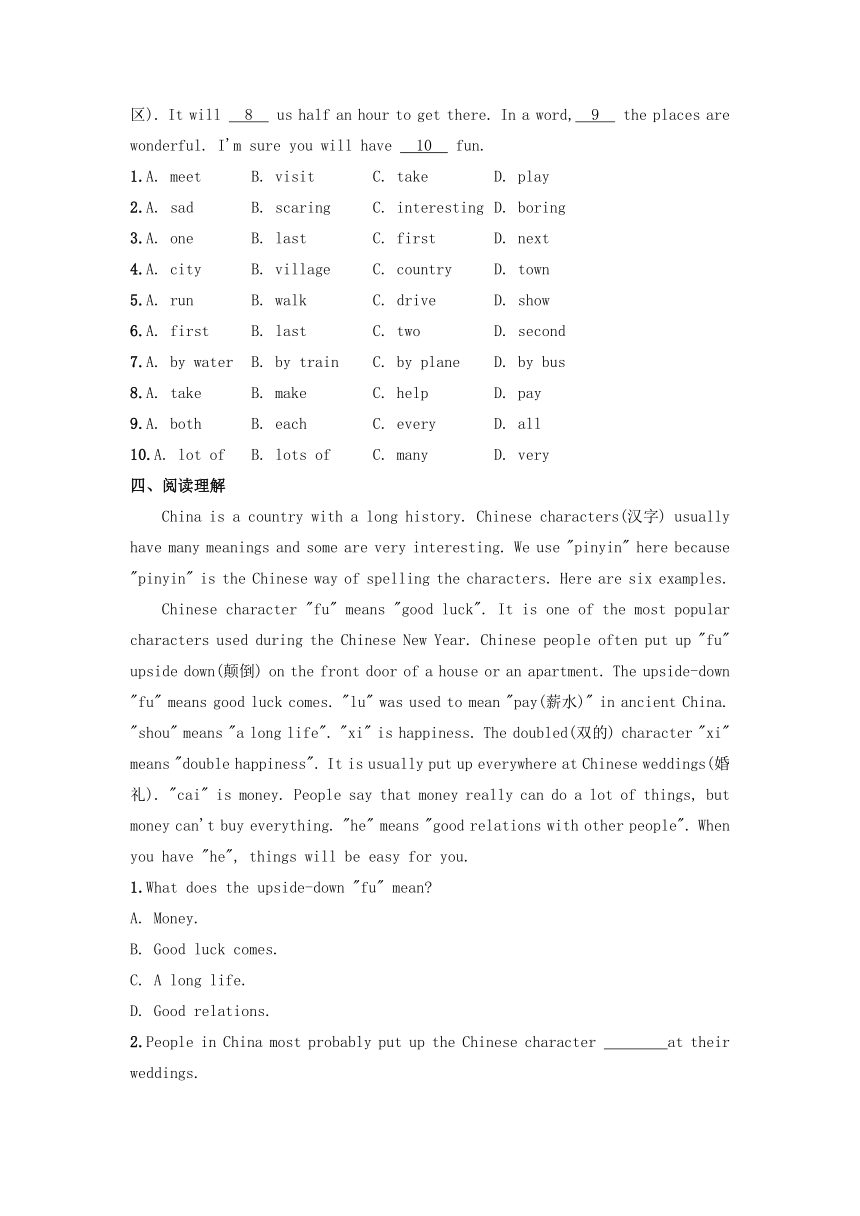冀教版七年级上册Unit 8 Countries around the world Unit Review同步练习 (含答案)
文档属性
| 名称 | 冀教版七年级上册Unit 8 Countries around the world Unit Review同步练习 (含答案) |

|
|
| 格式 | docx | ||
| 文件大小 | 20.2KB | ||
| 资源类型 | 教案 | ||
| 版本资源 | 冀教版 | ||
| 科目 | 英语 | ||
| 更新时间 | 2023-01-12 00:00:00 | ||
图片预览



文档简介
《Unit Review》同步练习
一、语法专练
(A)用方框中所给单词或短语填空(每词或短语限用一次)
what, how, where, how much, whose
1.— is your father
—He is fine, thanks.
2.— ruler is this
—It's Li Hua's.
3.— is your pen pal from
—She is from Canada.
4.— do you like doing on Sundays
—I like going shopping with my mum.
5.— is your schoolbag
—It's 120 yuan.
(B)单项选择
6.— languages can you speak
—Three.
A. How soon B. How often
C. How much D. How many
7.— does he have P.E.
—He has P.E. at 3:00 in the afternoon.
A. When B. What
C. Where D. Why
8.— will Mrs. Lin go to Canada
—To visit her friends there.
A. How B. When
C. Why D. What
9. are you doing here, Mike You must go to bed. It's late.
A. What B. Who
C. When D. Where
10.— is Bill, John I can't find him.
—Look! He is on the playground.
A. Where B. What
C. When D. Who
(C)对下列句子中的画线部分提问(每空一词)
11.The eggplant(茄子) is purple.
is the eggplant
12.Washington, D.C. is the capital city of the U.S.
is the capital city of the U.S.
13.They speak English.
do they speak
14.She knows a lot about Australia.
does she know about Australia
15.North points up on a map.
points up on a map
二、根据短文内容,在空白处填入一个适当的单词或括号内单词的正确形式
I have a new classmate this morning. Her name is Juliet. She 1. (come) from Sydney. She is a 2. (love) girl with big eyes and long hair. She likes 3. (China). She can only speak it a little.
She introduces (介绍) herself and tells 4. (we) something about her hometown. She is happy to 5. (know) two languages. She visits the Great Wall 6. the Palace Museum. There are many 7. (palace) in the Palace Museum. She knows a lot from her father. She often goes to the zoo with her parents 8. weekends. The baby panda makes her happy and 9. (excite). Sometimes she has 10. picnic with her friends in the park near her house.
三、完形填空
Welcome to Beijing!
I'm very happy to help you 1 this great city. Beijing is the capital city with many 2 places. The 3 day, we are going to visit Tian'anmen Square and the Palace Museum. They are in the centre of the 4 . They are near our hotel, so we are going to 5 there. The 6 day, we are going to visit the Great Wall and the Ming Tombs(明十三陵) 7 because they are very far. The last day, we are going to visit the Summer Palace. It is in the suburbs(郊区). It will 8 us half an hour to get there. In a word, 9 the places are wonderful. I'm sure you will have 10 fun.
1.A. meet B. visit C. take D. play
2.A. sad B. scaring C. interesting D. boring
3.A. one B. last C. first D. next
4.A. city B. village C. country D. town
5.A. run B. walk C. drive D. show
6.A. first B. last C. two D. second
7.A. by water B. by train C. by plane D. by bus
8.A. take B. make C. help D. pay
9.A. both B. each C. every D. all
10.A. lot of B. lots of C. many D. very
四、阅读理解
China is a country with a long history. Chinese characters(汉字) usually have many meanings and some are very interesting. We use "pinyin" here because "pinyin" is the Chinese way of spelling the characters. Here are six examples.
Chinese character "fu" means "good luck". It is one of the most popular characters used during the Chinese New Year. Chinese people often put up "fu" upside down(颠倒) on the front door of a house or an apartment. The upside-down "fu" means good luck comes. "lu" was used to mean "pay(薪水)" in ancient China. "shou" means "a long life". "xi" is happiness. The doubled(双的) character "xi" means "double happiness". It is usually put up everywhere at Chinese weddings(婚礼). "cai" is money. People say that money really can do a lot of things, but money can't buy everything. "he" means "good relations with other people". When you have "he", things will be easy for you.
1.What does the upside-down "fu" mean
A. Money.
B. Good luck comes.
C. A long life.
D. Good relations.
2.People in China most probably put up the Chinese character at their weddings.
A. upside-down "cai"
B. upside-down "fu"
C. doubled "xi"
D. doubled "he"
3.Which of the following is NOT true according to the passage
A. "cai" is money.
B. "lu" was used to mean "pay" in ancient China.
C. "shou" means keeping thin.
D. Things will be easy if you have "he".
4.The passage is mainly about .
A. Chinese history
B. Chinese characters
C. Chinese "pinyin"
D. Chinese people
参考答案
一、语法专练
1.How ——你的爸爸怎么样 ——他很好,谢谢。
2.Whose ——这是谁的尺子 ——它是李华的。
3.Where ——你的笔友来自哪里 ——她来自加拿大。
4.What ——周日你喜欢做什么 ——我喜欢和我的妈妈去购物。
5.How much ——你的书包多少钱 ——120元。
6.D ——你会说多少种语言 ——三种。根据答语可知,问句对可数名词复数提问,故用How many。
7.A 根据答语可知,问句问的是时间,故when符合语境。
8.C 根据答语"To visit her friends there"可知,此处问的是原因。
9.A 句意:Mike,你在这里做什么呢 你必须睡觉了。天晚了。what"什么"符合语境。
10.A 根据答语可知,问句问的是地点,故选A。
11.What colour
12.What
13.What language
14.How much
15.What direction
二、根据短文内容,在空白处填入一个适当的单词或括号内单词的正确形式
1.comes 2.lovely 3.Chinese 4.us
5.know 6.and 7.palaces 8.on
9.excited 10.a
三、完形填空
1.B 我很高兴能帮助你参观这个很棒的城市。根据下文中的"we are going to visit Tian'anmen Square and the Palace Museum"可知,是带领你参观这个城市。
2.C 北京是首都,有许多有趣的(interesting)地方。
3.C 第一天,我们将会参观天安门广场和故宫博物院。
4.A 它们在北京的市中心。根据上文中的"Beijing is the capital city"可知选A。
5.B 它们就在我们的旅馆附近,因此我们将步行去那里。根据"They are near our hotel"可推测出要步行去。
6.D 第二天,我们将会参观长城和明十三陵。
7.D 根据"they are very far"可推知,我们乘公共汽车去。
8.A 到达那里将会花费我们半个小时的时间。这是"It takes sb.+一段时间+to do sth."句型的一般将来时,will后接动词原形。
9.D 总之,所有的地方都很棒。
10.B 我相信你(们)会玩得很开心。应用lots of修饰不可数名词fun,故选B。
四、阅读理解
1.B 细节理解题。由第二段中的"The upside-down ‘fu’ means good luck comes"可知,倒着的"福"字意味着好运到来。
2.C 细节理解题。由第二段中的"The doubled(双的) character ‘xi’ means double happiness. It is usually put up everywhere at Chinese weddings(婚礼)"可知,人们经常在婚礼上贴"囍"字。
3.C 细节理解题。由第二段中的"‘shou’ means ‘a long life’"可知,"寿"意味着长寿,而不是保持苗条。
4.B 主旨大意题。通读全文可知,本文以六个汉字为例介绍了中国的汉字。故选B。
一、语法专练
(A)用方框中所给单词或短语填空(每词或短语限用一次)
what, how, where, how much, whose
1.— is your father
—He is fine, thanks.
2.— ruler is this
—It's Li Hua's.
3.— is your pen pal from
—She is from Canada.
4.— do you like doing on Sundays
—I like going shopping with my mum.
5.— is your schoolbag
—It's 120 yuan.
(B)单项选择
6.— languages can you speak
—Three.
A. How soon B. How often
C. How much D. How many
7.— does he have P.E.
—He has P.E. at 3:00 in the afternoon.
A. When B. What
C. Where D. Why
8.— will Mrs. Lin go to Canada
—To visit her friends there.
A. How B. When
C. Why D. What
9. are you doing here, Mike You must go to bed. It's late.
A. What B. Who
C. When D. Where
10.— is Bill, John I can't find him.
—Look! He is on the playground.
A. Where B. What
C. When D. Who
(C)对下列句子中的画线部分提问(每空一词)
11.The eggplant(茄子) is purple.
is the eggplant
12.Washington, D.C. is the capital city of the U.S.
is the capital city of the U.S.
13.They speak English.
do they speak
14.She knows a lot about Australia.
does she know about Australia
15.North points up on a map.
points up on a map
二、根据短文内容,在空白处填入一个适当的单词或括号内单词的正确形式
I have a new classmate this morning. Her name is Juliet. She 1. (come) from Sydney. She is a 2. (love) girl with big eyes and long hair. She likes 3. (China). She can only speak it a little.
She introduces (介绍) herself and tells 4. (we) something about her hometown. She is happy to 5. (know) two languages. She visits the Great Wall 6. the Palace Museum. There are many 7. (palace) in the Palace Museum. She knows a lot from her father. She often goes to the zoo with her parents 8. weekends. The baby panda makes her happy and 9. (excite). Sometimes she has 10. picnic with her friends in the park near her house.
三、完形填空
Welcome to Beijing!
I'm very happy to help you 1 this great city. Beijing is the capital city with many 2 places. The 3 day, we are going to visit Tian'anmen Square and the Palace Museum. They are in the centre of the 4 . They are near our hotel, so we are going to 5 there. The 6 day, we are going to visit the Great Wall and the Ming Tombs(明十三陵) 7 because they are very far. The last day, we are going to visit the Summer Palace. It is in the suburbs(郊区). It will 8 us half an hour to get there. In a word, 9 the places are wonderful. I'm sure you will have 10 fun.
1.A. meet B. visit C. take D. play
2.A. sad B. scaring C. interesting D. boring
3.A. one B. last C. first D. next
4.A. city B. village C. country D. town
5.A. run B. walk C. drive D. show
6.A. first B. last C. two D. second
7.A. by water B. by train C. by plane D. by bus
8.A. take B. make C. help D. pay
9.A. both B. each C. every D. all
10.A. lot of B. lots of C. many D. very
四、阅读理解
China is a country with a long history. Chinese characters(汉字) usually have many meanings and some are very interesting. We use "pinyin" here because "pinyin" is the Chinese way of spelling the characters. Here are six examples.
Chinese character "fu" means "good luck". It is one of the most popular characters used during the Chinese New Year. Chinese people often put up "fu" upside down(颠倒) on the front door of a house or an apartment. The upside-down "fu" means good luck comes. "lu" was used to mean "pay(薪水)" in ancient China. "shou" means "a long life". "xi" is happiness. The doubled(双的) character "xi" means "double happiness". It is usually put up everywhere at Chinese weddings(婚礼). "cai" is money. People say that money really can do a lot of things, but money can't buy everything. "he" means "good relations with other people". When you have "he", things will be easy for you.
1.What does the upside-down "fu" mean
A. Money.
B. Good luck comes.
C. A long life.
D. Good relations.
2.People in China most probably put up the Chinese character at their weddings.
A. upside-down "cai"
B. upside-down "fu"
C. doubled "xi"
D. doubled "he"
3.Which of the following is NOT true according to the passage
A. "cai" is money.
B. "lu" was used to mean "pay" in ancient China.
C. "shou" means keeping thin.
D. Things will be easy if you have "he".
4.The passage is mainly about .
A. Chinese history
B. Chinese characters
C. Chinese "pinyin"
D. Chinese people
参考答案
一、语法专练
1.How ——你的爸爸怎么样 ——他很好,谢谢。
2.Whose ——这是谁的尺子 ——它是李华的。
3.Where ——你的笔友来自哪里 ——她来自加拿大。
4.What ——周日你喜欢做什么 ——我喜欢和我的妈妈去购物。
5.How much ——你的书包多少钱 ——120元。
6.D ——你会说多少种语言 ——三种。根据答语可知,问句对可数名词复数提问,故用How many。
7.A 根据答语可知,问句问的是时间,故when符合语境。
8.C 根据答语"To visit her friends there"可知,此处问的是原因。
9.A 句意:Mike,你在这里做什么呢 你必须睡觉了。天晚了。what"什么"符合语境。
10.A 根据答语可知,问句问的是地点,故选A。
11.What colour
12.What
13.What language
14.How much
15.What direction
二、根据短文内容,在空白处填入一个适当的单词或括号内单词的正确形式
1.comes 2.lovely 3.Chinese 4.us
5.know 6.and 7.palaces 8.on
9.excited 10.a
三、完形填空
1.B 我很高兴能帮助你参观这个很棒的城市。根据下文中的"we are going to visit Tian'anmen Square and the Palace Museum"可知,是带领你参观这个城市。
2.C 北京是首都,有许多有趣的(interesting)地方。
3.C 第一天,我们将会参观天安门广场和故宫博物院。
4.A 它们在北京的市中心。根据上文中的"Beijing is the capital city"可知选A。
5.B 它们就在我们的旅馆附近,因此我们将步行去那里。根据"They are near our hotel"可推测出要步行去。
6.D 第二天,我们将会参观长城和明十三陵。
7.D 根据"they are very far"可推知,我们乘公共汽车去。
8.A 到达那里将会花费我们半个小时的时间。这是"It takes sb.+一段时间+to do sth."句型的一般将来时,will后接动词原形。
9.D 总之,所有的地方都很棒。
10.B 我相信你(们)会玩得很开心。应用lots of修饰不可数名词fun,故选B。
四、阅读理解
1.B 细节理解题。由第二段中的"The upside-down ‘fu’ means good luck comes"可知,倒着的"福"字意味着好运到来。
2.C 细节理解题。由第二段中的"The doubled(双的) character ‘xi’ means double happiness. It is usually put up everywhere at Chinese weddings(婚礼)"可知,人们经常在婚礼上贴"囍"字。
3.C 细节理解题。由第二段中的"‘shou’ means ‘a long life’"可知,"寿"意味着长寿,而不是保持苗条。
4.B 主旨大意题。通读全文可知,本文以六个汉字为例介绍了中国的汉字。故选B。
同课章节目录
- Unit 1 School and friends
- Lesson 1 Hello!
- Lesson 2 Teacher and Students
- Lesson 3 Welcome to Our School
- Lesson 4 What Is It?
- Lesson 5 May I Have a Book?
- Lesson 6 Things for School
- Unit 2 Colours and Clothes
- Lesson 7 Jenny's New Skirt
- Lesson 8 Danny's Favourit Colou
- Lesson 9 Whose Coat Is This?
- Lesson 10 Clothes for a Cold Day
- Lesson 11 Clothes around the World
- Lesson 12 Let's Go Shopping!
- Unit 3 Body Parts and Feelings
- Lesson 13 Body Parts
- Lesson 14 Colours and Feelings
- Lesson 15 Tall or Short
- Lesson 16 Happy or Sad
- Lesson 17 Seeing a Docto
- Lesson 18 We All Look Different!
- Unit 4 Food and Restaurants
- Lesson 19 Time for Breakfast!
- Lesson 20 I Like the Supermarket!
- Lesson 21 At the Market
- Lesson 22 In the Restaurant
- Lesson 23 The Corner Store
- Lesson 24 Eat Good Food!
- Unit 5 Family and Home
- Lesson 25 Jenny's Family
- Lesson 26 Li Ming's Family
- Lesson 27 Danny at Home
- Lesson 28 A Family Picnic
- Lesson 29 A Birthday Card
- Lesson 30 Grandma's Birthday Party
- Unit 6 Let's Go!
- Lesson 31 Let's Go to the Bookstore!
- Lesson 32 At the Supermarket
- Lesson 33 Let's Go to the Zoo!
- Lesson 34 On the Farm
- Lesson 35 Let's Go to the Museum!
- Lesson 36 Let's Go to the Movie Theatre!
- Unit 7 Days and Months
- Lesson 37 Seasons and Weathe
- Lesson 38 Nick's Busy Month
- Lesson 39 A Class Calenda
- Lesson 40 When Is Your Birthday?
- Lesson 41 Holidays
- Lesson 42 Happy Holidays!
- Unit 8 Countries around the world
- Lesson 43 Directions
- Lesson 44 Jack's Goodbye Party
- Lesson 45 China
- Lesson 46 Canada and the U.S.
- Lesson 47 The U.K. and Australia
- Lesson 48 English-Speaking Countries
